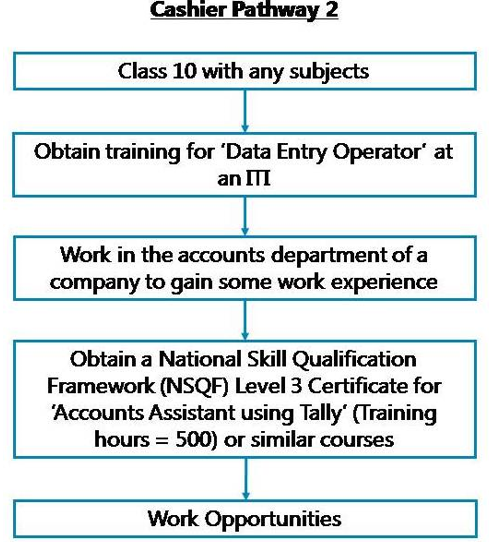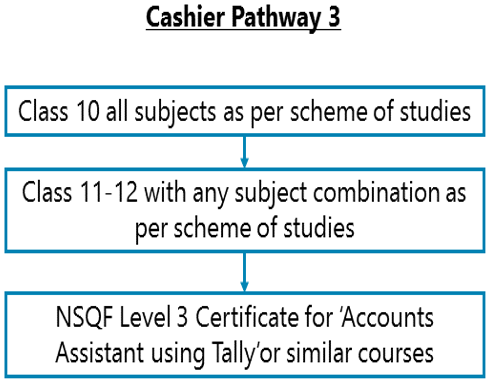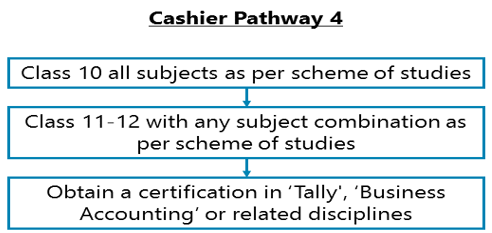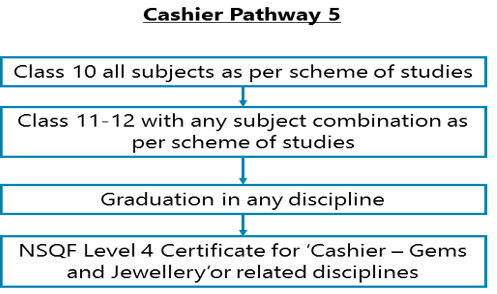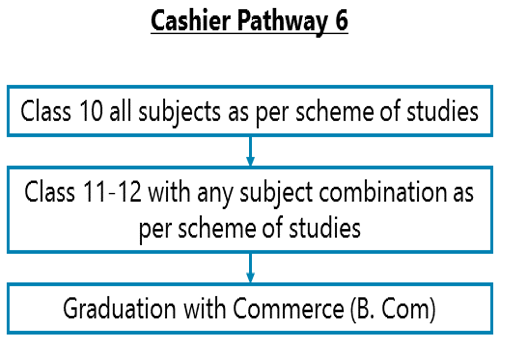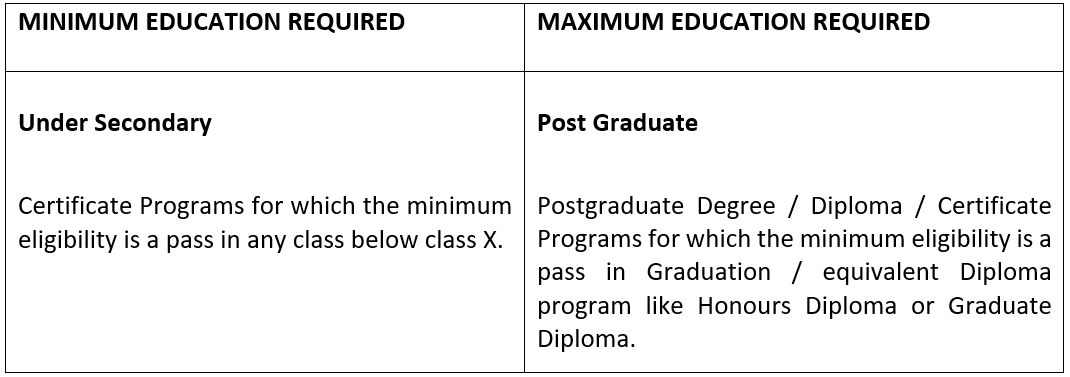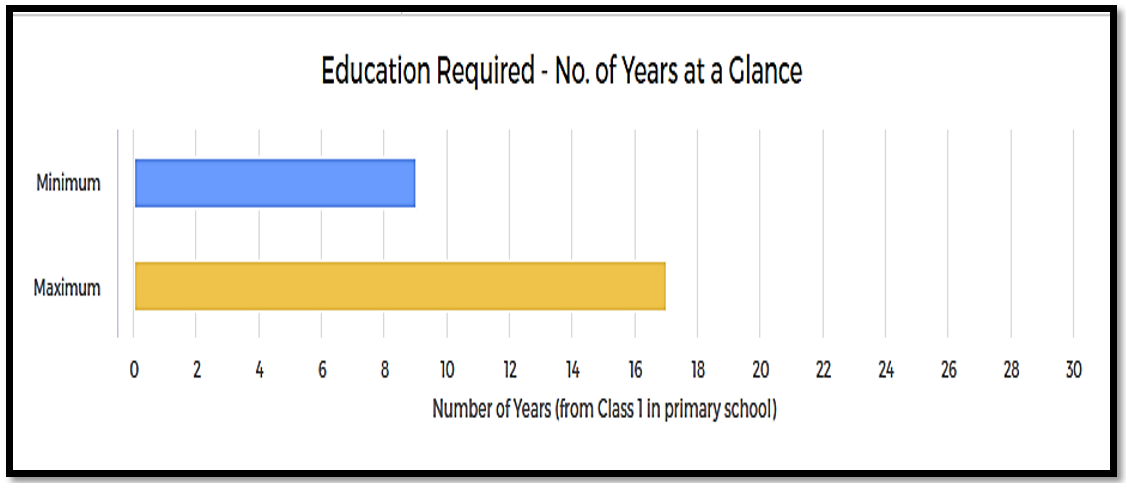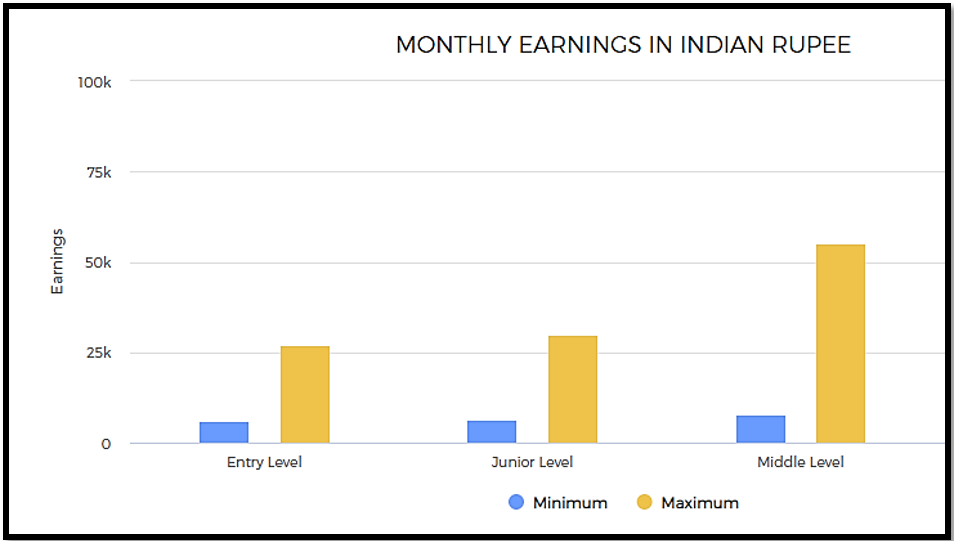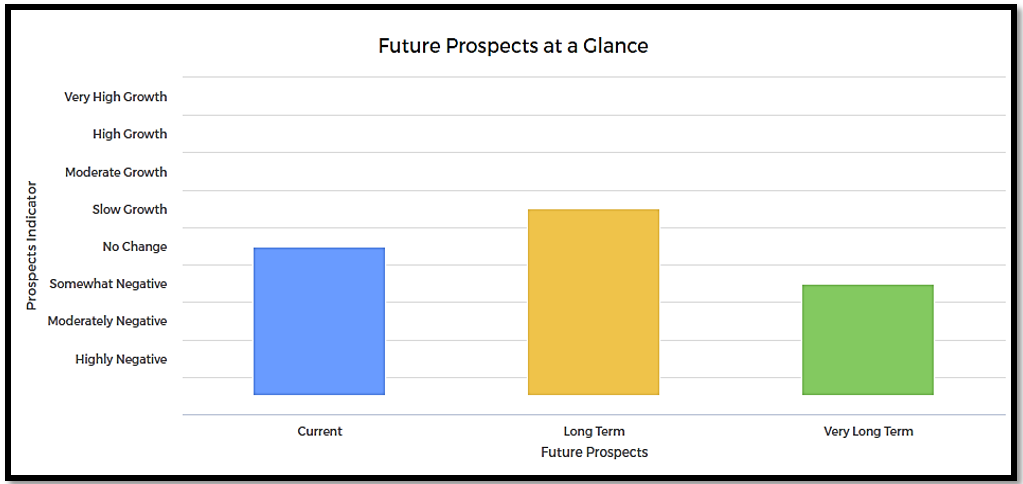Cashier
Entry Level Qualification
10
Career Fields
Banking & Finance
For Specially Abled






 ,
,
Career Entrance Exam
About Career
PARTICULARS | DESCRIPTION |
Name | Cashier |
Purpose | Counting Money |
Career Field | Banking & Finance |
Required Entrance Exam | IBPS CLERK, IBPS PO, SBI CLERK, SBI PO |
Average Salary | 1,00,000 - 3,00,000 Rs. Per Year |
Companies For You | Retail Shops, Verifone & Many More |
Who is Eligible | Class 10th Pass |
Primarily, your work as a Cashier will be to receive money, disburse money and keep the records of the transactions in books of accounts accurately, either on paper registers or electronically, using different accounting software. You will have to count currency notes before disbursement or on receiving. Larger numbers of currency notes are counted by banknote counters (currency counting machines) but smaller numbers are generally counted by hands.
For disbursing money, you may have to fill up vouchers with the details of the transaction or you have to check such vouchers or notes filled up by the receiver of the money. You must ensure that all the details are accurate. If you work in a bank, you will have to examine the cheque or the withdrawal slip submitted by a customer for withdrawal of money. Remember that, disbursement of money can also be done electronically these days. For example, you can disburse or transfer money through internet banking or using company credit cards, debit card, or digital wallet.
Similarly, while receiving money, you will have to keep track of the source of money, i.e., from where and how the money is being received. If you are working in a shop, then you will have to write or print cash receipts, invoices, and bills, against which you will receive money from the buyers. Remember that, you may receive money by electronic means also. For example, people may pay you through internet banking, credit or debit card or even through the digital wallet.
Keeping accurate records of all these transactions is perhaps the most critical aspect of the job of a cashier. As a Cashier, you will be responsible for maintaining the cash balance accurately. This will be your daily responsibility. Your records of cash transactions must match with the value of the currency notes in hand at the end of the day.
Key Roles and Responsibilities
1. As a Cashier, you will be engaged with one or moreof the following roles and responsibilities: -
2. Processing all commercial invoices, bills, purchase orders, payment vouchers, payment receipts, credit/debit notes etc.
3. Counting money in cash drawers before starting shifts to ensure that the amounts are matching with records.
4. Receiving payments from customers/clients by cash, check, credit cards, debit cards, internet banking or digital wallets.
5. Making payments to vendors, suppliers, employees, and others by cash, cheque, debit/credit cards, internet banking, digital wallets, etc.
6. Entering all financial transaction data into company accounting books accurately and keeping them up-to-date.
7. Answering customers' queries and providing information on procedures or policies.
8. Doing necessary paperwork, compiling all the data from the papers into company accounting books and maintaining physical copies of the essential information also.
9. Generating different types of financial statements such as Profit and Loss Statements, Balance Sheet, etc.
10. Computing tax liabilities and processing all tax payments accurately.
11. Assisting in financial audit procedures.
Career Entry Pathway
Class 8 in school - NSQF Level 2 Certificate for ‘Cashier’
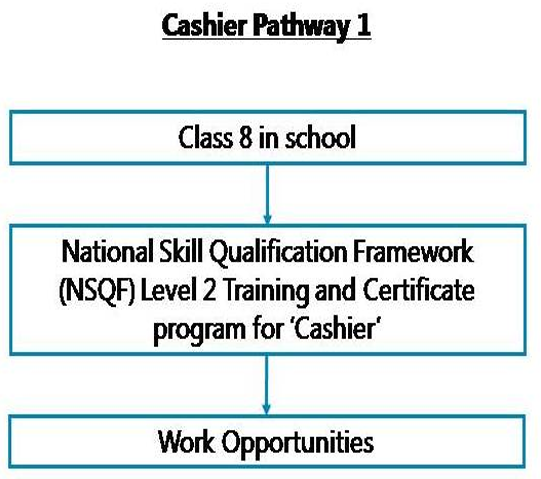
After completing Class 8 in school, you can go for National Skill Qualification Framework (NSQF) Level 2 Training and Certificate program for ‘Cashier’. A total number of training hours is 200. You can go for higher level training programs also after gaining work experience of at least 7-8 years.
Class 10 with any subjects– Obtain training for ‘Data Entry Operator’ at an ITI – work with Accounts team at any small business - NSQF Level 3 Certificate for ‘Accounts Assistant using Tally’ or similar courses
After completing Class 10 in school, you can go for training at any ITI for the role of ‘Data Entry Operator’ to gain basic knowledge of computers and data entry. You should then work in the accounts department of any company to gain some work experience. Then you can obtain a National Skill Qualification Framework (NSQF) Level 3 Training and Certificate program for ‘Accounts Assistant using Tally’or similar courses. Your age should be at least 14 years. The total number of training hours is 500.
Class 10 all subjects as per scheme of studies - Class 11-12 with any subject combination as per scheme of studies – NSQF Level 3 Certificate for ‘Accounts Assistant using Tally’or similar courses
After completing Class 11-12 with any subject combination as per scheme of studies, you can obtain a National Skill Qualification Framework (NSQF) Level 3 Training and Certificate program for ‘Accounts Assistant using Tally’or similar courses. Your age should be at least 14 years. The total number of training hours is 500. Ideally, you should go for the NSQF Training and Certification after working in the accounts department of a company to gain some work experience first.
Class 10 all subjects as per scheme of studies - Class 11-12 with any subject combination as per scheme of studies – obtain a certification in ‘Tally', ‘Business Accounting’ or related disciplines
After completing Class 11-12 with any subject combination as per scheme of studies, you can obtain a certificate in the current version of the Tally software or similar industry relevant disciplines from Tally Learning Institute (TIL) head quartered in Bangalore but with several centers across the country or similar professional institutes. The duration of a course may range from 1-6 months. You become a Tally Certified Professional with the certificate.
Class 10 all subjects as per scheme of studies - Class 11-12 with any subject combination as per scheme of studies - Graduation in any discipline - NSQF Level 4 Certificate for ‘Cashier – Gems and Jewellery ’or related disciplines
After completing your graduation in any discipline, you can go for National Skill Qualification Framework (NSQF) Level 4Training and a Certificate program for ‘Cashier – Gems and Jewellery’ or related disciplines. The total number of training hours is 240.
Class 10 all subjects as per scheme of studies - Class 11-12 with any subject combination as per scheme of studies - Graduation with Commerce (B. Com)
After completing Class 11-12 with any subject combination as per scheme of studies, you need to complete your graduation with a Bachelor of Commerce degree (B. Com).
Required Qualification & Competencies
Even if you do not want to finish school, you can just pass Class 8 and get a job after getting relevant training and certification. Ideally, you should complete Class 12 or graduation with B. Com and then obtain NSQF qualifications/Tally Certificate.
Competencies Required
1. You should have interests for Conventional Occupations. Conventional occupations involve repetitive and routine tasks as well as fixed processes or procedures for getting things done. These occupations involve working more with data, systems, and procedures and less with ideas or creativity.
2. You should have interests for Realistic Occupations. Realistic occupations involve more practical and hands-on activities than paperwork or office work. Realistic occupations often involve physical activities for getting things done using various tools and equipment.
3. You should have knowledge of Mathematics - Knowledge of arithmetic and other mathematical disciplines and their applications.
4. You should have knowledge of Computers - Competency in applications like Microsoft Office (Word, Excel) etc.
5. You should have knowledge of Accounting - Knowledge of various principles and methods for maintaining records of commercial and financial transactions and records, preparing various reports and statements, ensuring compliance with commercial and business laws and rules of a country, etc.
6. English Language - Knowledge about English grammar, words, spelling, sentence construction, using English to communicate with others, reading in English, etc.
7. Clerical and secretarial Skills - Knowledge of various clerical tasks and procedures such as handling emails and phone calls, filling up forms, data entry, managing files, managing records, maintaining information databases, stenography, scheduling appointments, and other office procedures and general administrative tasks.
8. Active Listening Skills - Giving full attention to what other people are saying, understanding the points being made by others, asking questions, etc.
9. Critical Thinking - Skills in the analysis of complex situations, using logic and reasoning to understand the situations and take appropriate actions or make interpretations and inferences.
10. You always or mostly prefer to stick within a routine or carry out routine and repetitive activities.
11. You are always or mostly organised in your day-to-day life and activities.
12. You are always or mostly disciplined in your action and behaviour.
13. You are practical always or in most situations.
14. You are always or mostly dependent on others or on set rules and procedures.
Career - Job Opportunities & Profiles
Job opportunities are vast for Cashiers. With the relevant training and certifications, you can deal with jobs like inventory/stock management, invoicing, purchase order management, discount and various other job roles.
There are many companies that hire Cashiers with only a high school certificate (12th pass) without any higher professional certifications but you will need relevant work experience for that, of at least 5-7 years with any small scale enterprise or businesses or retail shops.
If you become a Tally Certified Professional as above, you can get better jobs in larger companies. You can get a job as a Cashier / Accounts Executive / Junior Accountant or in similar positions after proper training or certifications.
Career Growth
You can certainly progress to be an Accounts Officer, Assistant Store Manager etc. in any organization or small/medium format stores etc. after some initial experience as a Cashier with proper training and certification.
You may have to start with simple data entry roles so you can rise up to higher roles with better pay. You can also further learn to use other useful financial accounting software. This will also help you in progressing to larger companies in the future.
Salary Offered
Salaries vary according to job profiles and the kind of facilities you get to work at.
1. In the entry-level jobs: You may expect to get about Rs.6,000 – 27,000 per month.
2. Salaries increase with your work experience and as you get promoted.
3. In the junior-level jobs, with 1-5 years of work experience, you may expect to get about Rs.6,500 –30,000 per month.
4. In the mid-level jobs, with 6-12 years of work experience, you may expect to get about Rs.8,000 – 55,000 per month.
5. In the senior-level jobs, with 15+ years of work experience, you may expect to get about Rs. 12,000- 90,000 or more per month.
Monthly Earnings In Indian Rupee
1. Entry level: 0 - 2 years of work experience
2. Junior Level: From 1 to 12 years of work experience
3. Mid-Level: From 5 to 20+ years of work experience
4. Senior Level: From 10 to 25+ years of work experience (there could be exceptions in some high-end technical, financial, engineering, creative, management, sports, and other careers; also in the near future, people will reach these levels much faster in many careers and in some careers, these levels will have no meaning as those careers will be completely tech skill driven such as even now, there is almost no level in a Cyber Security Expert’s job)
Work Activities
As a Cashier, you will be:
1. Using computers for work - Using computers for day-to-day office work; using computer software for various applications in day-to-day professional work; entering data and process information; for writing.
2. Getting Information and learning - Observing, hearing, reading, using computers, or otherwise obtaining information.
3. Processing of Information - Searching, compiling, tabulating, calculating, auditing, verifying or otherwise dealing with information processing including data entry, transcription, recording, storing and maintaining databases.
4. Organizing, planning and prioritizing tasks - Planning and organizing tasks in order to achieve work goals; prioritizing tasks to achieve goals and making the best use of the time available.
5. Handling administrative activities - Handling various administrative tasks and managing day-to-day operations.
6. Assessing and determining compliance with standards, laws, rules, and guidelines - Using relevant information, auditing information, processes and systems to determine whether organizations or people are complying with standards, laws, rules and guidelines.
7. Communicating with customers - Communicating with potential, new and existing customers of your organization in writing, verbally or otherwise.
Future Prospects
The future of Cashiers looks moderately good. Cashiers are required for each and every business today and the Indian Retail Market is rapidly expanding to Tier I, II and III cities. More than 90% of the Retail Market is still offline today including physical stores which require cashiers mandatorily. Indian Retail is one of the fastest growing markets and is expected to reach the mark of 1 trillion US Dollars by 2020.
The Indian banking sector is expanding its branch network in therural areas to capture new business opportunities. It is expected to open new banking facilities in more than 700 districts across the country by 2019.
Future Prospects At A Glance


